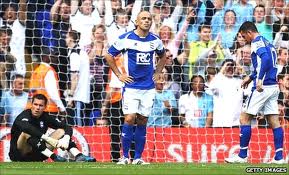The FA Cup has been grossly devalued in recent years and I suggest the blame lies squarely with the FA and the Premier League. From the top teams using FA Cup games as little more than reserve matches with revenue, to the glory of Wembley being diluted for semi-finals, the tournament has lost most of its splendour.
Below are the five main reasons why I blame the powers that be.
1) Semi-finals at Wembley
As a rule of thumb, semi-finals ought not be held at the same venue as the final. Not only does it cheapen the grandeur of the cup’s climax, it intensifies the significance of quarter-finals.
Not a problem you may think, but when you consider that a manager like David Moyes dropped half his team for a Merseyside derby (!) in order to achieve a false sense of glory (which a Wembley semi-final inherently is – see Bolton for details) then something is not right.
2) Rescheduled fixtures
Having mentioned Moyes, and after being so critical of him this week, I’ll give him his due now. In an interview with the Daily Mirror earlier this week, the Everton manager blamed the Premier League for rearranging the Liverpool game so close to the quarter-final.
He is completely right. The Premier League’s decision betrays an evident lack of understanding of the demands placed on clubs at this stage of the season.
As both Everton and Liverpool are involved in the FA Cup this weekend, and the dates for the semis are set for April 14/15, it obviously makes most sense to allow both teams to concentrate on the quarters then reschedule the league match for a time in between the two.
Not to mention the fact that the Premier League’s choice of date clearly gives Sunderland and Stoke (Everton and Liverpool’s respective opponents) an advantage.
3) Timing of the fixtures
I admit this is a personal one but even so, see what you think.
Everton and Sunderland’s quarter-final was played at 12:45 on a Saturday afternoon. I could go into a lengthy diatribe here about the damaging influence of television and advertising on football, but instead, I’ll keep it short.
This was both sides’ biggest game of the season and for the FA to choose for them to play it at a time that not only requires physiological adjustment and preparation, but one that also notoriously results in the worst possible atmosphere is a real disgrace.
Is it really too much to ask for the FA to arrange a marquee fixtures specifically to create the best possible conditions for a great game?
4) Standardising the final
This year’s FA Cup final (May 5) will again be played on the same day as a Premier League game (Arsenal vs Norwich). Bearing in mind that every other team plays 24 hours later, and the fact that Tottenham are away at Villa that day, I find the decision to place Arsenal’s game on the Saturday strange to say the least.
For the sake of caution, I’m tempted to say ‘there’s probably a good reason for it’, but if I’m honest, that’s not what I think at all. Given the current FA and the apparent air-plucking that goes into decision-making, there is probably no good reason for it at all.
The energetic pre-final buzz – one of the most photographically vivid aspects of my youth as a football fan – has sadly dissipated to indifference as the showpiece of the season has become just another game.
5) Incentivisation
The winner of the FA Cup receives £2 million and a place in the Europa League.
This fee is less than Birmingham City received last season for their final league position of 18th which as we all know, saw them relegated.
That is completely absurd. Can it really be more economically viable to get relegated than win the FA Cup?
As the honour has diminished over time (and it really has if you recall that Chelsea and Manchester City account for four of the last five winners) then further incentivisation is required.
Offer a better prize and everyone will care more, simple as that.
By Chris Smith
Follow me on Twitter@cdsmith789 or click here to return to the homepage.


